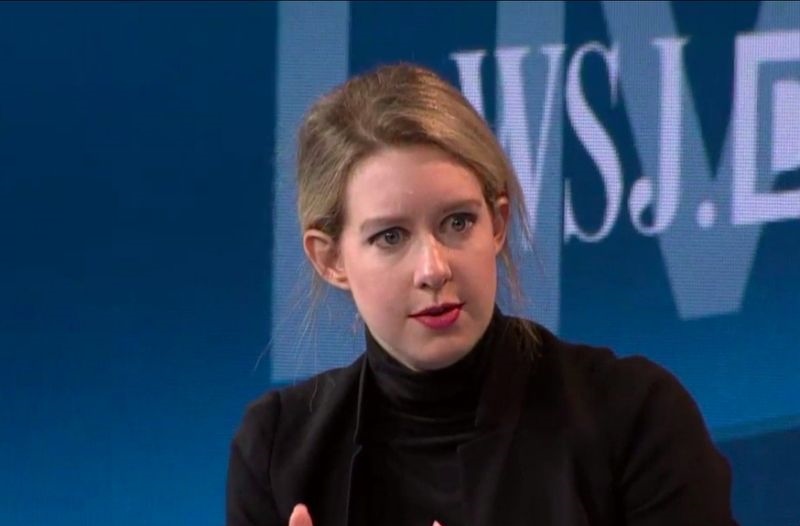Theranos
June 18, 2018 | Expert Insights

Elizabeth Holmes, the founder of US start-up, Theranos, who promised to revolutionize blood testing has been hit with criminal charges. Theranos' former president Ramesh "Sunny" Balwani was also charged.
Holmes was the world's youngest female self-made billionaire, and Theranos was one of Silicon Valley's unicorn startups.
Background
Elizabeth Holmes was born on February 3, 1984 in Washington, D.C. Holmes went to Stanford to study chemical engineering. When she was a freshman, she became a "president's scholar," an honor which came with a $3,000 stipend to go toward a research project.
Holmes spent the summer after her freshman year interning at the Genome Institute in Singapore. Holmes soon filed a patent application for a "medical device for analyzing, monitoring and drug delivery," a wearable device that would administer medication, monitor patients' blood, and adjust the dosage as needed. By the next semester, Holmes had dropped out of Stanford altogether, working on Theranos in the basement of a college house.
Around the same time, questions were being raised about Theranos' technology. Ian Gibbons — chief scientist at Theranos and one of the company's first hires — warned Holmes that the tests weren't ready for the public to take, and that there were inaccuracies in the technology.
By August 2015, the FDA began investigating Theranos, and regulators from the government body that oversees laboratories found "major inaccuracies" in the testing Theranos was doing on patients.
By October 2015, Wall Street Journal reporter John Carreyrou published his investigation into Theranos' struggles with its technology. Carreyrou's reporting sparked the beginning of the company's downward spiral.
Carreyrou found that Theranos' blood-testing machine, named Edison, couldn't give accurate results, so Theranos was running its samples through the same machines used by traditional blood-testing companies.
By 2016, the FDA, Centers for Medicare & Medicaid Services, and SEC were all looking into Theranos. In July 2016, Holmes was banned from the lab-testing industry for two years. By October, Theranos had shut down lab operations and wellness centers.
In March 2018, Theranos, Holmes, and Balwani were charged with "massive fraud" by the SEC. Despite the charges, Holmes has been allowed to stay on as CEO of Theranos, as it's a private company, not public.
Analysis
Federal prosecutors have indicted Theranos founder Elizabeth Holmes and the company’s former president Ramesh “Sunny” Balwani with nine counts of wire fraud and two counts of conspiracy to commit wire fraud. Prosecutors claim that the pair defrauded investors, doctors, and patients while promoting and running their now disgraced blood-testing startup.
In the new court filing in San Jose, prosecutors allege that Holmes and Balwani engaged in a scheme to mislead investors about the state and capabilities of the company’s blood-testing technology and defrauded them out of more than $100 million. The prosecutors also allege that the pair defrauded doctors and patients by knowingly misleading them with false advertising and marketing that stated that their company could provide accurate and reliable health tests on just drops of blood from a finger-prick with their proprietary technology.
Later investigations, sparked by reporting from the Wall Street Journal, revealed that Theranos' blood testing tech was flawed and faulty. The findings led to a dizzying downward spiral of lawsuits, regulatory sanctions, and tens of thousands of blood tests results being corrected or voided.
In March, the Securities and Exchange Commission filed civil charges against Holmes, Balwani, and Theranos, alleging that they had committed “massive fraud” The SEC accused them of obtaining $700 million in investments by orchestrating an “elaborate, years-long fraud in which they exaggerated or made false statements about the company’s technology, business, and financial performance.”
Holmes and Theranos settled with the SEC, while Balwani will face the SEC in courts. As part of the settlement arrangement, Holmes will pay a $500,000 fine and be barred from serving as a director or officer of a public company for 10 years. In settling, Holmes did not admit or deny wrongdoing.
Just before the criminal charges were filed, Theranos announced that Holmes would be stepping down as the company’s CEO. She will remain as the founder and a board member. David Taylor, the company’s general counsel, will take her place according to various media reports. Theranos is reportedly nearing bankruptcy and down to two dozen or fewer employees after major layoffs.
Assessment
Our assessment is that it was the fierce desire of Ms. Holmes to succeed and become rich that perhaps turned her into a sociopath. Her propensity to state the alternate facts combined with a lack of personal, managerial and business ethics resulted in her showing no signs of remorse or admitting wrong doing to the patients whose lives she had endangered. We believe that the role of the Wall Street Journalist John Carrreyrou’s in exposing the criminal behavior of Theranos, which had some of the most powerful men on its board - including Henry Kissinger, George Schulz, General Jim Mattis and William Perry, is quite exemplary. We also feel that this is a clear instance of “oversight” by board members and shows how they too can be manipulated.








Comments